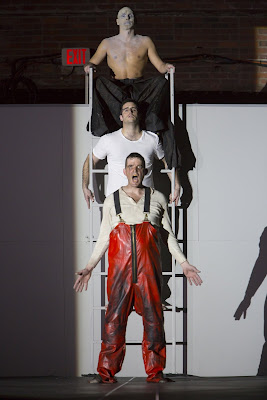 |
| (From top) Yury Yanowsky, Neal Ferreira & David McFerrin in "In the Penal Colony" (photo: T. Charles Erickson) |
One would be hard pressed to imagine a
more challenging venue for attending an opera than the Cyclorama
Building in Boston's South End, but that's precisely where Boston
Lyric Opera's current production, “In the Penal Colony”, is being
performed. A one-act chamber opera by Phillip Glass, with a libretto
by Rudolph Wurlitzer (in English), it was first produced in 2000 in
Seattle. It's about eighty minutes long; Glass termed it his “pocket
opera”. Based on Kafka's 1914 dystopian short story, it features a
death machine, namely a harrow, a farm implement with spike-like
teeth intended to level soil, but used for medieval torture. It's at
the center of this dark tale of the breakdown of civil society, about
crime and unusual punishment, set in a penal colony. Written and
composed to feature three performers and a string quintet (two
violins, viola, cello, and bass), the work turned out to be a perfect
choice for this venue (as part of the BLO's Opera Annex program),
thanks to some ingenuity on the part of the creative team, especially
in overcoming potential acoustical concerns.
The story begins as a Visitor (tenor
Neal Ferreira) arrives at the penal colony, invited by its new
commander to witness an execution, conducted by the Officer (baritone
David McFerrin), of a Man (actor Yury Yanowsky). The condemned man
doesn't know his fate and has had no chance to defend himself; “guilt
is always beyond doubt”. The machine is constructed to emboss a
description of the man's crime into his flesh during twelve hours of
torture until the “transfiguring moment of redemption as the victim
realizes the nature of his crime”. The Visitor is appalled but
feels he has no right to intervene. When the machine malfunctions,
the Officer frees the prisoner, climbs in, and discovers that “he
never found what he sought and what all the others found...no sign of
redemption...none at all”.
Throughout the piece, with its
pulsating “ostinatos”
(Glass' typical musical perseverations), ranging from forceful surges
to more meditative calm, with its plaintive sections for the violins,
inquiring cello, and sudden pauses, there was conveyed a
feeling of dread, most especially with the abrupt silence after the
climax. Thanks in large part to the superb interpretation of
Conductor Ryan Turner and his quintet, and the marvelous Stage
Direction by R.B. Schlather, with effective Set Design by Julia
Noulin-Merat, clever Costume Design by Terese Wadden and wondrously
original Lighting Design by JAX Messinger, this was a somewhat creepy
and chilling experience, precisely as it was intended to be. McFerrin
and Ferreira were both in fine voice, managing to fill the hall with
their intensely dramatic singing and movement, which also involved
former Boston Ballet star Yanowsky, a tremendous asset to the
performance. The efforts of the entire team made for an unforgettable
production. Even the surtitles (by John Conlin and Allison Voth)
became an integral part of this portrayal of a disintegrating
society.
Some
of the audience may not have been devotees of the composer's oeuvre
before this; this brief but
spellbinding opera could break that Glass ceiling. It's arguably his
most approachable music, and, as presented by the BLO, a true triumph
in the company's history.
No comments:
Post a Comment